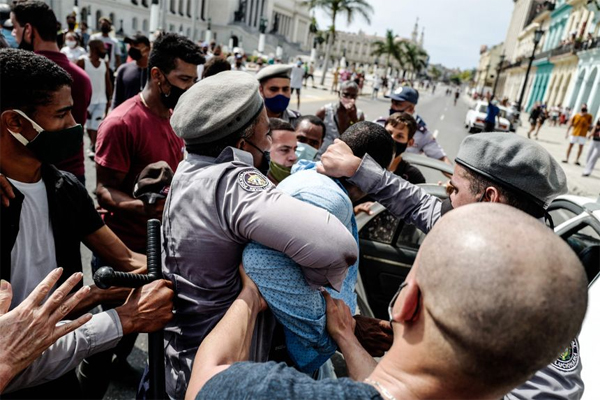
Photo: Adalberto Roque/AFP
While Americans were last-minute gift shopping on Christmas Eve, Luis Aguilar Rivera was uploading a lamentation from Havana on YouTube.
The day before, the Cuban military dictatorship had handed Mr. Aguilar Rivera’s 21-year-old son—who reportedly has cognitive issues—a 22-year prison sentence for his participation in the antigovernment protests of July 11-13. “It seems incredible that in this country, where it is said that the people come first, this is happening. It cannot be,” Mr. Aguilar Rivera insisted on the video.
It can be and it is—though not without the use of legendary Soviet coercion still practiced in Cuba, as Mr. Aguilar Rivera explained in his YouTube post. “I have official testimonies that the judge who handed down the sentence started crying when everyone left.” He added: “He knows the great injustice that is being committed.”
The Aguilar Riveras are part of something much bigger than one case, as U.S. assistant secretary of state for Western Hemisphere affairs, Brian Nichols, tweeted on Dec. 26: “150+ Cubans across the island face up to 25 yrs from sham trials between Dec 13–24. The Government of #Cuba must stop these unjust sentences for peaceful protests. We call for the immediate release of #11J protestors.”
Note the timing. With the international press largely off on holiday, the second half of December was an ideal moment to lock up dissidents and throw away the key. The harsh penalties are meant as a warning to Cubans about what happens to nonconformists. The strategy may have worked so far. Yet its long-run effectiveness is doubtful.
The July protests were history-making because the breadth and size of the crowds on the streets shocked the regime, as did the public’s lack of fear and its expressions of deep hatred for the system.
The use of cellphones to capture videos of Cubans pouring into the streets and chanting “liberty” was also new. So was the recording of the dictatorship’s brutal reply in the days that followed. Heavily armed riot police and rapid-response brigades beat demonstrators. Plainclothes intelligence agents tracked down dissidents, raided their homes, and thrashed family members. Suspects were dragged off to detention.
The world watched in horror, knowing full well that what goes on in Cuba’s dungeons—where neutral observers are not permitted to evaluate conditions—is far worse.
The raw repression was too much for the world to ignore. The European Parliament condemned Cuba for its response to the protests and called for Magnitsky sanctions against those who had ordered or engaged in the crackdown.https://tpc.googlesyndication.com/safeframe/1-0-38/html/container.html
Team Biden had been signaling that it wanted to reinstitute Obama administration engagement policies, including American travel to the island and the free flow of remittances. But as images of the state-sanctioned violence against unarmed civilians streamed into living rooms across the U.S., the administration put on hold any change in policy.
Pariah status is costly for the regime because Cuba has trouble attracting investment and, if you don’t count human beings, it doesn’t export much of anything. It depends heavily on tourism for hard currency.
Even so, as Mr. Nichols noted in his tweet, Havana is now doubling down on its use of terror. It’s the only thing holding the status quo together.
This crackdown is the harshest since Cuba’s Black Spring in 2003, when some 75 democracy activists were arrested and many received 20-year sentences. This time around, according to data collected by the Havana-based Working Group for July 11 Justice, two people have received 30-year sentences and prosecutors are asking the same for four others. Another 23 people have received between 20 and 25 years and similar sentences are requested for more than 65 others.
Forty-five minors, age 14 to 17, were arrested for demonstrating. Fourteen of them remain in detention. Of 88 arrested who are between 18 and 21, 45 remain jailed.
On Dec. 23 Diario de Cuba, an independent news outlet on the island, reported on the conviction of 15 people who received sentences of between 12 and 30 years for protests on July 12 in the poor neighborhood of La Güinera on the outskirts of Havana. “Seven of them” the news report said, “are under 18 years of age.” The convicted were warned that appeals would increase their sentences.
The Ladies in White—an opposition group that began as the female relatives of jailed dissidents—remain targets. On Dec. 27 Cubans learned that one of the group’s members, Sissi Abascal, 23, from the province of Matanzas, had received a six-year sentence.
Meantime, Maykel Osorbo and Luis Manuel Otero Alcántara linger in prison. They are leaders of Havana’s dissident San Isidro Movement. Neither has been charged. Sources on the island say that both have been offered release if they agree to go into exile. Both have declined.
This genie is not going back in the bottle. Havana, you have a problem.
Write to O’Grady@wsj.com.
Mary Anastasia O’Grady is an Opinion Columnist, writes “The Americas,” a weekly column on politics, economics and business in Latin America and Canada that appears every Monday in the Journal. Ms. O’Grady joined the paper in August 1995 and became a senior editorial page writer in December 1999. She was appointed an editorial board member in November 2005. She is also a member of the board of directors of the Indianapolis-based Liberty Fund.
Editor’s Note: This article was originally published by The Wall Street Journal (WSJ), on January 02, 2022. All comments posted and published on Petroleumworld, do not reflect either for or against the opinion expressed in the comment as an endorsement of Petroleumworld.
Use Notice: This site contains copyrighted material the use of which has not always been specifically authorized by the copyright owner. We are making such material available in our efforts to advance understanding of issues of environmental and humanitarian significance. We believe this constitutes a ‘fair use’ of any such copyrighted material as provided for in section 107 of the US Copyright Law. In accordance with Title 17 U.S.C. Section 107. For more information go to: http://www.law.cornell.edu/uscode/17/107.shtml.



